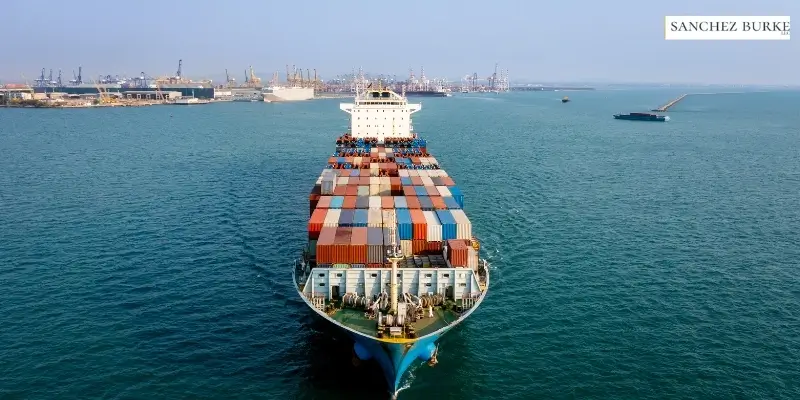New Iberia Maritime Injury Lawyer
New Iberia Maritime Injury Attorney
Working on the water presents unique challenges, and injuries in maritime settings can turn lives upside down. Maritime injury laws are designed to protect workers and passengers who suffer harm in these dangerous settings. Working with a New Iberia maritime injury lawyer can offer options for compensation and accountability after an accident.

Balancing Efficiency and Care
Working through a maritime injury claim requires a seasoned professional with extensive experience in personal injury cases. At Sanchez Burke, LLC, we make every client feel valued due to our warmth and professionalism. Quick responses, exceptional legal skills, and a personal touch are the foundations of our practice.
The Basics of Maritime Injury Law
Maritime injury law addresses incidents that take place on navigable waters or in connection with maritime work. Workers on ships, offshore rigs, and docks are often exposed to risks not found in jobs on land. Laws like the Jones Act and the Longshore and Harbor Workers’ Compensation Act (LHWCA) were designed to offer protections after an injury.
Determining negligence is often an important part of maritime injury cases. Employers have a duty to provide a safe work environment, upkeep equipment, and make sure that all employees are trained properly. Laws relating to maritime employers differ from traditional personal injury cases.
Types of Injuries and Compensation
Workers face a wide range of potential injuries, from fractures caused by falls to life-altering conditions like spinal damage or traumatic brain injuries. Many injuries result from unsafe conditions like slippery decks, faulty equipment, or poor safety standards. Common injuries include back and neck injuries, crushing injuries from cargo or equipment, chemical exposure and burns, drowning, or health problems related to toxic substances.
Compensation in maritime injury cases in New Iberia can cover costs like medical bills, rehabilitation, and lost earnings. Maintenance and cure benefits are unique to maritime law, providing basic living expenses and medical care regardless of fault. For more severe injuries, additional damages might be awarded if negligence can be proven.
Steps To Take After a Maritime Injury in New Iberia
Maritime injuries require care and a methodical strategy to protect both your health and legal rights. Whether you’re a seaman, longshoreman, or other maritime worker, taking specific actions can make a huge difference in your recovery and compensation, including:
- Report the injury immediately. Notify a supervisor or vessel operator about the incident as soon as possible so that the accident is documented. Failing to create a report might hurt your case. Even if you think the injury is minor, reporting creates an official record that establishes when and where the incident occurred. Some maritime workers have seen their cases denied if they wait too long to notify their employers.
- Seek medical attention. Get care from a qualified doctor, even if the injury seems small. Medical records serve as evidence for proving the extent of harm and connecting it to the incident. The unique nature of maritime work means that some injuries can worsen over time, especially with the physical demands of this type of work. A medical exam can reveal injuries before complications develop.
- Document the scene. Take photos, gather contact information from witnesses, and note details like weather and equipment conditions. This evidence can help establish fault later. Maritime accidents often involve multiple factors, so record everything from sea conditions and visibility to equipment maintenance records and safety protocols in place at the time.
- File the appropriate reports. Injured workers often need to complete an accident report or log entry. Providing accurate and detailed information is important to build a strong case. Take time to review any forms before submitting them, and keep copies for your records. Remember that these documents could become evidence in future legal proceedings, so stick to the facts.
Maritime laws are difficult to understand. An experienced maritime injury attorney can help identify which laws apply to your case and build a claim tailored to the details of the injury. Different maritime laws provide varying levels of protection and compensation. A knowledgeable attorney can evaluate your situation so that you pursue all legal remedies and meet relevant deadlines.
FAQs About New Iberia, LA Maritime Injury Laws
What Qualifies as a Maritime Injury Under Louisiana Law?
What qualifies as a maritime injury under Louisiana law includes any injury that happens to someone working in a marine-related environment, like on a ship, oil platform, or dock. These laws address accidents involving negligence, unsafe equipment, or hazardous conditions. An injury might qualify if it occurs on navigable waters or in areas connected to maritime work like ports or shipyards.
Who Is Covered by Maritime Injury Laws?
Those that are covered by maritime injury laws include seamen, longshoremen, harbor workers, and some offshore employees. The Jones Act applies to seamen, or people whose work contributes to a vessel and spend time on said vessel. There are other laws that cover dock workers and people engaged in loading or unloading cargo. Passengers and recreational boaters might also qualify under general maritime law if injured due to negligence or unsafe conditions.
What Types of Compensation Are Available for Maritime Injuries?
The types of compensation that are available for maritime injuries include compensation for medical expenses, lost wages, pain and suffering, and long-term care needs. Under laws like the Jones Act, seamen can also seek damages if an employer’s negligence caused the injury. There are also maintenance and cure benefits that cover living expenses and medical care during recovery that might be available regardless of fault.
How Is Negligence Determined in a Maritime Injury Case?
Negligence is determined in a maritime injury case when an employer, owner, or third party does not uphold their duty of care of keeping their employees safe. For example, unsafe equipment, inadequate training, or poorly maintained vessels can point to negligence. Proving negligence often requires showing that the responsible parties’ actions, including lack of action, caused the victim’s injuries.
Injured at Sea or Offshore?
Maritime injuries affect not just victims but also their families and livelihoods. Filing a claim can help you rebuild and recover. Whether you were injured on a vessel or offshore, explore the protections available to you by scheduling a consultation with Sanchez Burke, LLC today. A trusted maritime injury attorney can discuss the details of your case with you.
Sanchez Burke
Free Consultation With A Lake Charles
Attorney Who Can Help
For a free initial consultation, contact our Louisiana law firm online today or call us to speak with one of the firm’s talented attorneys.
awards & affiliations









